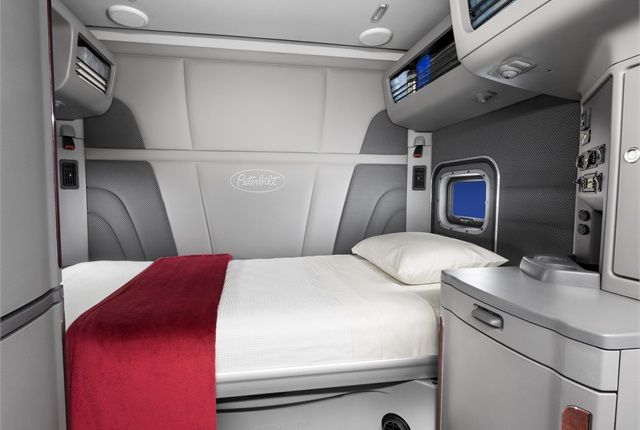We know that everyone — even truck drivers — needs to sleep, especially if spending long hours on the road. How do truck drivers sleep during cross-country deliveries, though? This article is meant to serve as a guide for truck drivers and owners/operators of trucking companies, outlining how they can get better quality sleep over the course of their longer runs so they can maximize their time on the road and stay fresh and alert.

How Many Hours of Sleep Do Truck Drivers Need?
Most adults need 7 to 9 hours of sleep a day. Of course, everyone is a little different, so how many hours of sleep do truck drivers need? The Federal Motor Carrier Safety Administration (FMCSA) Act does not say that a truck driver needs to sleep a particular number of hours, but its Hours of Service Rules provide some indirect guidance.
- A truck driver has a 14-hour window of work and can’t go over.
- In this window, a truck driver can work up to 11 hours, with the rest of the time dedicated to other tasks, like pre- and post- trips, unloading, and fueling.
- There must be at least one half-hour break to split the 11 hours into chunks of less than 8 hours each.
- A truck driver is entitled to 10 consecutive hours of rest prior to returning to duty.
- A truck driver is not to drive more than 60 hours in a 7-day period or 70 hours in an 8-day period.
- This “60/70-hour duty limit” can be restarted — only once a week — if the truck driver goes off-duty for 34 straight hours (“the 34-hour restart rule”).
FMCSA made these requirements because, according to the National Transportation Safety Board, over 30 percent of crashes that are fatal to the driver involve driver fatigue. Roughly 20 percent of accidents involving large trucks are caused by fatigued driving. We’re talking around 9,000 fatalities and over 200,000 serious casualties.
The sleep issue has been so important that the Act considers sleep apnea — a disorder that causes the sufferer’s breathing to stop and start repeatedly during slumber — a condition that would affect a truck driver’s ability to safely operate a vehicle.
While there is no specific sleep apnea regulation for a truck driver, the FMSCA Medical Review Board and Motor Carrier Safety Advisory Committee recently recommended administering sleep tests if a truck driver has a BMI of 35 or higher (as overweight/obese people are more prone to developing sleep apnea). They had also proposed a rule that would require a truck driver suffering from sleep apnea to be treated for them to be able to drive. Apparently, a truck driver with untreated sleep apnea is five times more likely to have a driving accident.
Where Do Truckers Sleep?
If unable to drive home to rest, a truck driver can also get some shut-eye at truck stops or rest areas en route. Truck stops are probably the most preferable places in which to pull over and rest. They are specifically built to handle large commercial vehicles. Some clients are kind enough to let truckers park on their sites and sleep a bit before heading out. Some companies also offer facilities where their drivers can grab a few winks.
Alternatively, a truck driver can pull off the side of the road or on a ramp, but this is not ideal. The truck driver could get ticketed — not to mention it might be dangerous for you and other motorists.
Most truckers whose routes will take them more than a day to complete equip their trucks with a sleeper cab behind the seats for when they don’t have a room. Trucks for team drivers may have double bunks in their sleeper cabs. Sleeper cabs can be very comfortable and have amenities, such as a fridge, microwave, or even an entertainment system. It is also a good idea to invest in a portable toilet, as it isn’t a part of the sleeper cab.
Trucker Sleep Tips
The life of a truck driver doesn’t make it easy to maintain a healthy lifestyle. The hours are long. You are sedentary most of the day, and there aren’t many exercise facilities readily available. Food options are not the healthiest [link to eating healthy article], and it requires discipline to watch what you eat, plan your meals, and pack your own food.
Sleep is an integral part of good health for everyone. It is especially important for truck drivers because you need to stay sharp and focused on the road to ensure the safety of other motorists — and yourself, of course.
Here are some trucker sleep tips to help you maximize your sleep on long journeys.
Make Your Cab Comfortable
There’s nothing like the comfort of home, right? If you can make your sleeper cab feel a little more like home, you may find it easier to relax and wind down for the night. Bring a memento or two — a favorite book or a framed picture, for example. You should also invest in a good mattress and pillow, as well as a decent insulation pad. Bring the proper comforter cover for whatever season you’re in.
Don’t Tucker Yourself Out
When you are overtired — especially if you’re “tired and wired” — it is actually harder to fall asleep. Some drivers are tempted to wait for their “second wind” and to keep pushing on until the next time they feel tired. This is not a safe idea. Even if you feel fine, you will react to things more slowly and have more difficulties focusing and paying attention. You will not be functioning optimally — and may even be more likely to fall asleep as you drive.
Try to Stick to a Sleep Routine
We know that life on the road can be somewhat predictable, or you may get irregular delivery schedules. If you are able to make and keep some semblance of a routine, however, it will go a long way to keeping your internal clock stable. It will be easier to enter “sleep mode” when you need to. If possible, and depending on how your deliveries are planned out, stop off for the night at roughly the same time. Your body will recognize that it is time to rest, and it will be easier for you to get to sleep.
Wind Down Properly
Very few people fall asleep as soon as their heads hit the pillow. That’s why it’s important to make sure you avoid stimulation before tucking yourself in. One of the biggest culprits is your phone or tablet. The blue light emitted from the screen tends to make your brain think it is still daytime, so you will have a less restful sleep.
Avoid taking calls you think will be stressful, or you’ll have thoughts milling around in your head. If there is a particular activity that helps you get to sleep faster — such as light yoga, reading, hot shower, or listening to music — make time for it. Some people like to meditate to quiet their minds.
Follow Your Circadian Rhythms
Our bodies program our sleep-wake cycles based on a number of internal and external stimuli, such as daylight, hormones, and medication. Apart from avoiding blue light right before bed, try to keep your environment nice and dark — sometimes a sleep mask will do wonders. Also, the further away you part from artificial light, the better for falling asleep.
It is best not to eat before bedtime because the body will focus on digesting, not rest. If you absolutely must eat, make sure it’s something light. Try not to eat less than 2-3 hours before you go to sleep. Don’t drink too much liquid lest you need to wake up through the night to go to the bathroom. Avoid coffee or other caffeinated drinks before bed. Your last caffeine intake should be at least 6 hours before bedtime.
If you are on sleeping medication, make sure it is according to your physician’s instructions. Check with your company, because some medications — whether for sleep or pain — may be a violation of its insurance policy.
Shut Out the Noise Pollution
If you can find a relatively quiet, peaceful area to park in, do it. Many parking lots will be quieter at night than they are during the day, but along roads, you may have to deal with noise made by other trucks and vehicles (and their vibrations through your cab).
It may be a good idea to find good noise-reducing headphones or earplugs and either play relaxing music or a sleep app. Some sleep apps play white noise, while others play sounds of nature or specialized music to help you fall asleep. Chances are, you will be able to find a decent sleep app for free — or at the very least, one that is free to try.
Drive More, Sleep Better, Make More Money
Getting enough sleep is important not only for a truck driver’s physical and mental health but also for the health of the business. You need to stay alert and keep your wits about you when you drive. You also want to maximize your working time and minimize your downtime. The more efficient you are, the more money you can make with your trips.
Of course, it may also make sense to optimize your time even further by hiring someone to take care of dispatch, rate negotiations, compliance, and document management so you can focus on making deliveries. That’s where Logity Dispatch can help. We offer all of these services and more as individual packages, but you can also opt for a more comprehensive package that best suits your business. Contact us today and tell us what you need.







